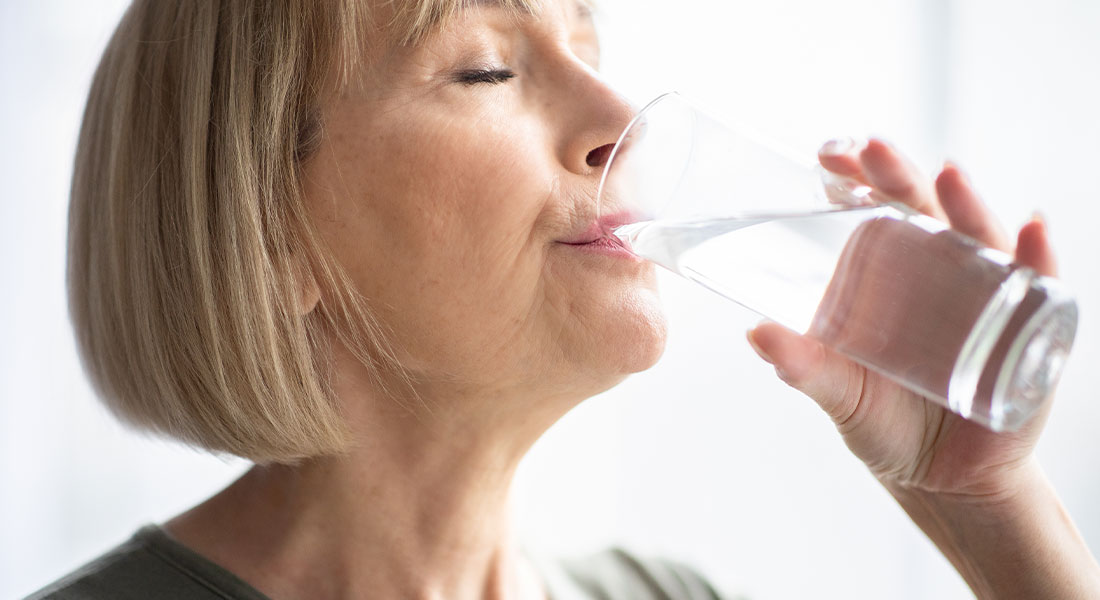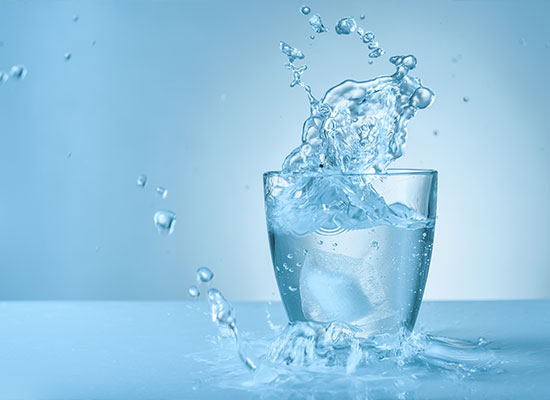 Contact
About Us
Articles
Home
Contact
About Us
Articles
Home

Healthy habits are not just about what you eat or how much you work out. Although these lifestyle behaviors are important, what is often missing from one's mind is hydration. Hydration is simply the state of the human body having enough fluids to function properly.
Since about 60% of the body is made up of water, we require plenty of fluid every day to maintain optimal health. However, statistics show that older adults, especially those of lower income, lower education and who are not obese aren't consuming enough plain water daily. Therefore, it's important to teach those adults at most risk about why hydration is so vital to stay healthy.
And if you don't like to drink plain water, there are other ways to maintain hydration. Just about any fluid, except for alcohol, counts toward your daily fluid intake. Nonetheless, older adults are at risk for not being able to maintain a healthy level of hydration. It's important to understand how much a person should drink each day, the impact of certain beverages on older adults and ways you can increase your fluid intake each day.
According to estimates, up to 28% of older adults in the United States are chronically dehydrated. This means their body is lacking the proper amount of fluid to maintain daily processes and functions. Water helps to lubricate the joints, remove waste from the body and keep your heart pumping, to name a few functions.
Dehydration, or a lack of adequate fluid in the body, can lead to serious health issues such as:
Although different health and wellness websites and social media pages will tell you how much water and fluid you should drink daily, there is no magic measure for everyone. The amount of water your body needs to stay healthy will depend on factors like height, weight, health status and physical activity level, for example.
Some experts suggest that men should consume around 15.5 cups of fluid daily, while women should consume 11.5 cups liters of fluid daily. Geriatric research shows that older men should consume about 10.5 cups daily, while women should consume about 2 liters (8.5 cups) daily. This includes fluid from foods such as water-rich fruits, soups, broths and vegetables, for example.
However, it would be nearly impossible to measure every single drop of fluid you consume daily. Therefore, the best way to check to see if you are drinking enough fluid is to look at your urine. This can seem strange at first, but if your urine is a lemonade or light straw color, then you are likely maintaining hydration. On the other hand, if your urine is a dark yellow, then you should consume more fluid.
Research shows that all older adults are at low risk for dehydration. This risk increases for those with trouble swallowing, or dysphagia. Research shows that this risk increases because of a blunted thirst response as part of the aging process. Not to mention that as a person ages, their body becomes less able to respond effectively to stressful events where dehydration results.
This means that changes in their renal function make it hard for their body to regulate water and sodium efficiently such as when sweating in hot weather or with physical activity. Other causes of dehydration in older adults include certain medications as well as body composition changes that result in less water in the body. Research shows that older adults who are in the hospital have a higher risk of complications and poorer outcomes if they are unable to maintain healthy levels of hydration.
Not all beverages are equal since some contain caffeine, others alcohol, and some even contain supplemental protein and nutrients. Therefore, you may wonder what impact each type of beverage has on the health of older adults. Let's take a look at a brief history of fluids for health and some evidence to show how each type of fluid impacts health. Then from there, you can see what fluids you should focus on when trying to improve your hydration status.
The use of fluids for health reasons dates back thousands of years. In traditional Chinese medicine, drinking tea was thought to help with issues such as phlegm, “pushing down the perverse,” as a diuretic, and to help reduce inflammation. Even today, drinking tea, especially green tea, shows promise to lower risk of type 2 diabetes through its polyphenol antioxidant content. In addition, ginger tea can help with nausea and indigestion, while peppermint tea can help relax sore throat muscles.
Coffee quickly became a popular drink in the United States after the Boston Tea Party in 1773. Coffee contains about 800 compounds, of which caffeine is the most well-known. But it's the chlorogenic acid compound in coffee that shows promise for helping provide antioxidant, antiviral and antibacterial properties as well as potential antitumor properties. More studies need to be done to confirm such benefits.
In the past century, particularly around the 1960s, you would often see health tonics on pharmacy shelves and prescribed by physicians to help with various ailments and “induce stimulation of body functions.” These elixirs of various forms are considered the original “energy” drinks. It's unclear whether such drinks had any real positive effect on health markers.
However, the energy drinks you know of today, the ones that promise increases in energy levels, may be harmful to heart health, can cause sleep problems and can also increase risk of dehydration due to their caffeine content. Although, in small amounts, caffeine may help healthy older adults in functional performance, timing performance and dexterity.
Alcohol in any amount and at any age provides no real health benefit, regardless of what social media and some wellness blogs will tell you. Research shows that what little heart health benefit an alcoholic drink like wine may provide does not outweigh the great disease burden alcohol intake places on the liver and other major organs.
A 2017 study shows that alcohol intake in older adults over the age of 60 years has greatly risen over the past two decades, especially in women. This is harmful not only because the aging body is more sensitive to alcohol, but because of alcohol's interaction with certain medications commonly taken by older adults.
Furthermore, heavy drinking, which is more than 14 drinks per week in men, or four in a day, and more than seven drinks per week in women, or more than three in a day, can increase disease risk. Such disease burden includes osteoporosis, memory problems, mood disorders and congestive heart failure, for example.
Finally, alcohol has a diuretic effect on the body. Therefore, this type of fluid will increase your chances of developing dehydration. Therefore, alcohol should be very limited or avoided in older adults.
On the other hand, nutritional drinks can greatly benefit the older adult in more ways than one. Not only do nutritional drinks like Ensure®, Boost® or Glucerna® help to provide a source of fluid, but such drinks can also provide a wide array of nutrients. For example, Ensure® Enlive contains 20 grams of protein per 8 fluid ounces as well as 25% or more of the recommended daily value of about 23 different vitamins and minerals.
A 2022 study shows that nutritional drink intake on a regular basis can improve quality of life measures. And since malnutrition is a high risk in this population, nutritional drinks can help prevent this by providing adequate calories and nutrients in a concentrated form that is convenient to consume. Such nutritional drinks typically provide low-sugar versions like Glucerna® for those who have diabetes and have renal-friendly brands for those with chronic kidney disease such as Nepro® Carb Steady, for example.
As mentioned, there are certain drinks that can aid hydration and health in older adults, and those that work against it. Therefore, use the following list to guide your fluid choices to help you maintain hydration and your best health today.
Fruit juices may provide healthy hydration in small amounts, but typically contain around 6 teaspoons of sugar per cup. Therefore, fruit juices should only be consumed in small amounts. Furthermore, sugary drinks like soda should also be limited for this same reason. Research shows that regular intake of sugar-sweetened drinks can increase risk of heart disease in otherwise healthy women as well as increase risk of metabolic syndrome. Experts report that drinking a diet soda or two each day will not cause any health risk in most people.
Increasing your fluid daily may seem like a hard task if it is something that you are not familiar with doing. It can be even more difficult if you are urinary incontinent and avoid drinking too much fluid to prevent urinary leaks and having to use the bathroom when you are out in public. This is especially hard for those with mobility issues who need assistance to use the bathroom.
However, even though these challenges are very real, it is vital to ensure that you are drinking enough fluid each day since dehydration can increase hospital stays due to dehydration-related issues like delirium, which is an impact on cognitive function, as well as acute kidney injury (AKI).
Due to such risks, use the following tips to help you increase your fluid intake daily and lower your risk of dehydration:

Drinking enough fluid each day can be hard since there are so many other things a person has to watch when it comes to maintaining health. But just like any other healthy habit, if you just take it one step at a time, then it can seem less overwhelming. Before you know it, your body will feel better, and you'll have more energy since you are finally drinking enough fluid.
For more advice on how to maintain proper nutrition and achieve successful aging, it can help to reach out to your insurance provider to see if you have coverage for registered dietitian services. Such a nutrition expert knows what the aging body needs to stay healthy and strong and can advise you on simple ways you can maintain your best health.
Alliance America is an insurance and financial services company dedicated to the art of personal financial planning. Our financial professionals can assist you in maximizing your retirement resources and achieving your future goals. We have access to an array of products and services, all focused on helping you enjoy the retirement lifestyle you want and deserve. You can request a no-cost, no-obligation consultation by calling (833) 219-6884 today.


